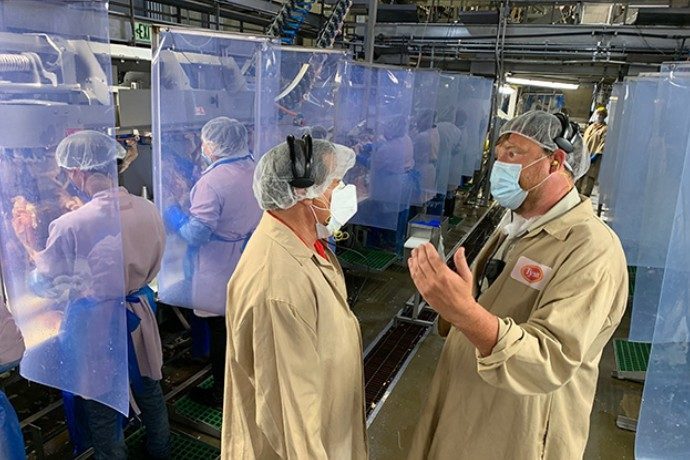SPRINGDALE, ARK. – Tyson Foods Inc. filed a 10-page report from a scientific working group this week laying out what processing plants can do to deal with the COVID-19 pandemic.
The working group, which was assembled by the meat producer and met in August, issued the report titled, “Promoting Workplace Safety in the Era of COVID-19: Keeping employees, their families and communities healthy and safe.”
Tyson Foods said it enlisted experts from across the healthcare spectrum, from organizational medicine specialists to virologists, immunologists, leaders in infectious disease and epidemiologists to work urgently to help protect its employees and safeguard the part of the global protein supply it manages.
Tyson started its analysis by pointing out the struggles it has seen from the beginning of the pandemic.
“The fragmented nature of the US healthcare system has not made our response easy and the lack of coordination and competition between government institutions and private entities for scarce resources has been highly challenging,” the report said.
The working group laid out important steps for businesses to remain open during the pandemic, starting with COVID testing and tracing.
“Testing remains critical and, to some degree, the most controversial aspect of the battle against COVID-19,” the report said. “The panel focused on the use of viral detection tests rather than antibody tests as a tool to understand and control risks. The United States has struggled more than many other countries to increase the number of tests to the level experts have recommended.”
Tyson also pointed out the rise in testing sensitivity and specificity. The group showed that accuracy in testing continues to improve with steady improvement in the next few months expected.
“A complicating feature of the testing landscape has been the emergence of faster, high throughput, testing technologies,” Tyson’s working group said. “While they suffer from lower sensitivity than rt-PCR-based tests, this shouldn’t present a problem now that testing levels have risen to the point where false negatives can be corrected in repeat testing.”
Next, the working group discussed what it will take to distribute vaccinations to workers. In its analysis, the group said the same preventive measures will still be required at plants even when a vaccine is administered.
“This is important to emphasize, according to the panel, because too little is presently known about the level and duration of immunity a vaccine will provide, and it is also unclear what penetration of vaccination will provide herd immunity,” the working group stated. “This is especially critical in light of the anticipated level of vaccine resistance, not solely from established ‘anti-vaxxers’ but from people who are unnerved by the speed with which the vaccine may be brought to market.”
Another key to a continued safe workplace will be the mobilization of private and public partnerships throughout 2020 and 2021.
The working group said “establishing memorandums of understanding in advance about roles and responsibilities, ensuring that corporate resources can be put at the disposal of cash-strapped local health departments and establishing shared goals to the right level of detail will go a long way to ensuring an effective response. This preparation could, in the future, include regular annual reviews and tabletop drills to help maintain readiness.”
Keeping people educated and changing employee behavior will also be key, according to Tyson’s report. The group emphasized that infection inside and outside the work environment is crucial for workplace safety during COVID-19.
Later, the panelists emphasized that much more lab and real-world research needed to be done in the future. Some of the questions the working group is looking to answer include what are safe levels of air exchanged per hour in a processing plant, how far do droplets travel in processing plants and the percentage of infections that come through the eyes.
In the end, Tyson’s working group concluded that COVID-19 will not be the last virus to jump from wild animals to humans.
“Only time will tell whether this virus fades away or becomes, once an effective vaccine is in use, a regular threat to manage such as measles or influenza,” the panelists concluded. “Regardless of the path it chooses, it is clear from our experience with the pandemic so far that commercial organizations, no less than public entities, need to be actively engaged seeking better insights about the way the virus works and finding innovative ways on how to handle the pandemic in the workplace and in the community.”
Members of the working group included:
- Dr. Daniel Castillo of Matrix Medical Network.
- Dr. Scott Cherry of Axiom Medical Consulting.
- Dr. David Acheson, former associate commissioner for foods at the FDA and now head of The Acheson Group.
- Dr. Harry Hull, formerly with the Centers for Disease Control, World Health Organization and State of Minnesota Epidemiology and Infectious Disease Specialist.
- Dr. Margje (Marthe) Haverkamp of Alvarez & Marsal.
The full report is available here.

